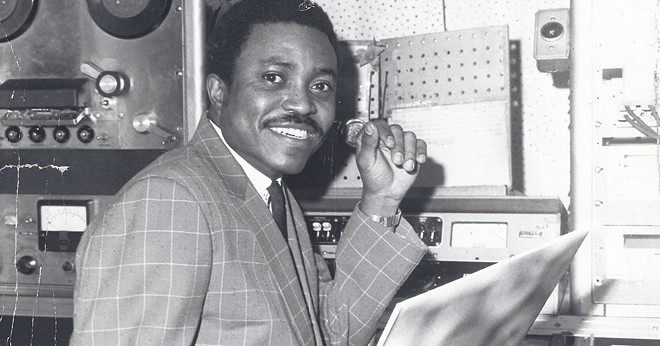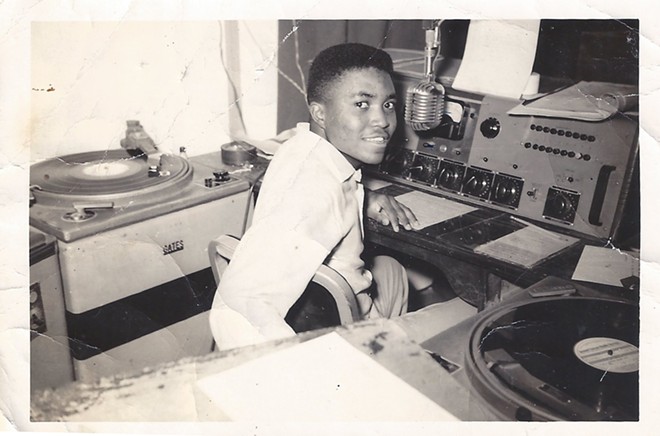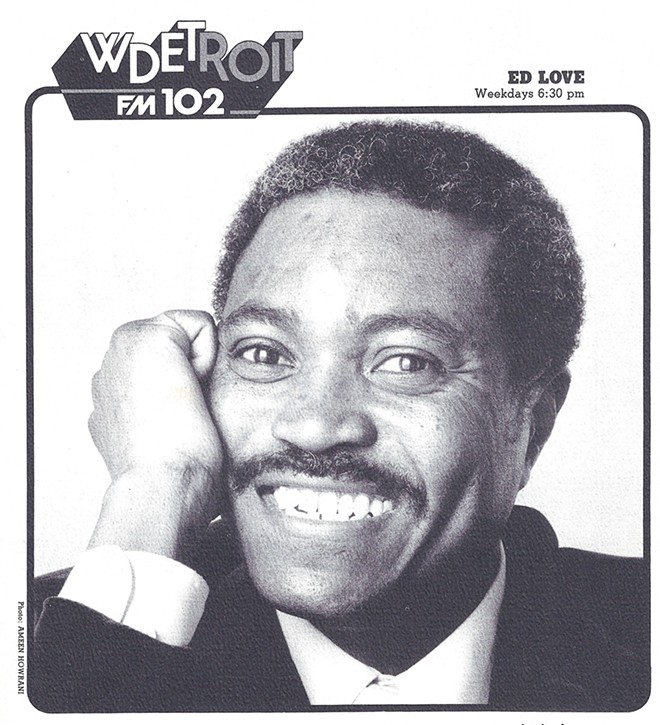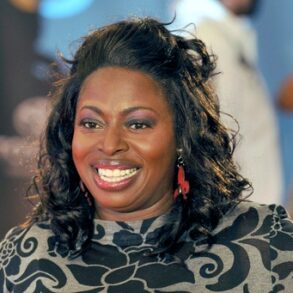
Courtesy of WDET
“There’s just two kinds of music,” radio on-air personality Ed Love says. “Good Jazz and bad jazz.”
As Ed Love reflects on four decades at WDET-FM 101.9, he declared during a marathon set of recorded interviews in September that:
“I plan to do this until I die and as long as I’m respected,” Love, the venerable jazz on-air personality, said about his tenure at WDET.
And the 91-year-old seemed to be enjoying broadcasting at National Public Radio’s Motor City member station as much as ever.
“Mary [Zatina] is the finest manager that I’ve ever had,” Love said about the station’s general manager. “This is ideal.”
Love suffered a stroke in 1994, which altered his voice somewhat, but his mind seems sharp and most important — he is a walking repository of jazz history. He agreed to more than eight hours of interview time last month.
He’s been honored by Capitol Hill lawmakers most notably in 2008, former Detroit mayors Coleman Young and Dennis Archer, and the Southeast Michigan Jazz Association. He has also earned a Charles H. Wright Museum of African American History Lifetime Achievement Award.
After a six-year stint at WQRS-FM 98.3, he has hosted Destination Jazz: The Ed Love Program on WDET since 1983 and hosted The Evolution of Jazz, a syndicated radio broadcast that was heard on 150 radio stations beginning in the late 1980s.
“It was the best that I ever did,” Love said about The Evolution of Jazz series.
Love was first heard in Detroit during his stints at African-American owned Bell Broadcasting’s WCHB-AM 1400 and WCHD-FM 105.9 that began in 1960. He also worked as a staff announcer at WXYZ-TV between 1970 and 1977. Over the years his popular radio on-air lines include:
- “Hi there. Love here.”
- “There’s just two kinds of music. Good Jazz and bad jazz.”
- “There are two kinds of jazz… real jazz and the rest is bull.”
In a wide-ranging set of topics, Love discussed being a great grandson of a slave; his favorite broadcast personalities; what “real” jazz is and isn’t; some of his all-time favorite recording artists and new performers; and drinking with Coleman A. Young during the 1960s when he was a Michigan state senator.
‘My mother was a jazz fan’
Edward James Love was born May 6, 1932 in Parsons, Kansas, which is about 100 miles south of Kansas City. Detroit has been his hometown since the late 1950s.
Love, the father of five, developed a love for jazz music at an early age, in large part through his mother Bessie Love, a granddaughter of a slave.
His maternal great grandmother was Phyllis Petite, a Black and Indigenous woman whose hue was the color of “coal,” Love said. He attended Petite’s funeral in about 1937 as a young child.
“I remember that,” he recalled.
He also has fond memories of his mother.
“She had all the records,” Love said about his late mother Bessie, who was a singer. “And I listened to them. One day she brought me a Roy Eldridge [a jazz trumpeter] book of solos and that stuff looked like Greek. I couldn’t read it. And I still can’t. So, I realized that playing jazz was not for me although I loved it. So, I just listened.”
Love was encouraged by a childhood friend, Harry Coker, to become a broadcaster. He attended Pathfinder Broadcast School in Kansas City, Missouri and graduated at the top of his class. His first job in broadcasting came in 1951 when Love joined radio station KIND-AM 1010 in Independence, Kansas. In 1952 Love joined the United States Air Force and became an Armed Forces Radio staffer in the Philippines, during the Korean War. After returning home from the armed service, Love returned to KIND to continue his career in radio. During the 1950s he also worked in West Virginia, Philadelphia, and New York.
Love also sought employment in Jackson, Kalamazoo, and Lansing.
“But I couldn’t get a job because I was Black,” Love recalled as he traveled through the state by bus.
By decades’ end, he was a Motor City resident.
“When I came to Detroit in the late ’50s, I saw all of these Black people and said, ‘Wow!’” Love added.
The city’s Black population had doubled between 1940 and 1950, from 149,000 to 300,000 residents. In 1954, Detroit voters elected Charles Diggs Jr. to the U.S. House of Representatives – making him the first African American from Michigan to serve on Capitol Hill. Three years later William Patrick became the first Black person to serve on the local government legislative branch, the Detroit Common Council, since the 1880s. During that decade clubs like the Blue Bird Inn on Tireman Street, Baker’s Keyboard Lounge on Livernois Avenue, and the Flame Show Bar on John R. Street were featuring local and national jazz talent.
WCHD radio broadcasted from Detroit’s Medical Center area on East Forest Street. Coleman A. Young, a Michigan state senator from 1965 until he became Detroit’s first Black mayor in 1973, lived in the apartment building that was owned by Haley Bell where WCHD was located on the first floor. Love and Young, who had an apartment on the sixth floor, struck a friendship that at times involved having a drink or two. During those days, Love worked as a U.S. postal carrier by day and spun jazz recordings at night.
“He would say ‘Come on up!’” said Love of Young during those days. “My show would come on at 7 o’clock. That would be about 6:30 or a quarter to seven. He’d say ‘have a drink’ and we’d be drinking. Shit, about a quarter to seven I’d say, ‘Man, I got to go’ and he’d ‘Man, you can have another. And I’d run do those steps and get on-air out of breath.’”
‘At WDET, nobody tells me what to say or play’
It’s been hard playing jazz, Love said about the radio marketplace over the years that mainly offers Top 40, R&B, and to some extent country music. Before moving to Detroit, Love spun vinyl discs in the mid-1950s by white pop singers like Pat Boone and Elvis Presley.
That was then; this is now.
“I’ve been in the business since ’51,” Love said. “At WDET, nobody tells me what to say or play.”
In contrast, most commercial stations have playlists drawn up by station management.
When he enters the studio, “I’m in a zone,” he added. “Radio is in my blood.”
“The WDET of today is largely due to the current team’s ability to stand on Ed Love’s shoulders and build on the reputation for excellence, knowledge, and attention to detail he brought to the station over 40 years ago,” Zatina said. “He set the bar for WDET and he will be on our air as long as we are blessed to have him in our midst.”
Love’s lists
Love came of age toward the end of the swing and big band eras and he witnessed the bebop era from the genre’s inception. It was during the World War II years. He has little affection for the fusion and so-called “Smooth Jazz” styles that became popular in the 1970s, ’80s, and ’90s.
On the WJZZ radio of that era that featured those styles, Love’s opinion is resolute.
“They were playing shit! They weren’t playing jazz,” said Love, who worked there until 1974. “Jazz has been abused in so many ways.”
When it comes to ranking his favorites female vocalists, Love likes Sarah Vaughan, Billie Holiday, Detroit’s own Betty Carter, Ella Fitzgerald, and Bessie Smith, in that order.
On the subject of pianists, Love counts Art Tatum, Bud Powell, Oscar Peterson, Pontiac’s Hank Jones, and Willie Anderson among his favorites.
As for a vibraphonist, Loves has as favorites Detroit’s Milt Jackson and Lionel Hampton as his top two.
“[Hampton] was a great of the swing era,” Love said. “So I often say that if there was no Lionel Hampton, there would be no Milt, but I became a real jazz fan in the bebop era. Bebop is my favorite phase of jazz. He’s my favorite – I don’t say that he was better.”
When it comes to bassists, Love’s favorites are Jimmy Blanton, Oscar Pettiford, Ray Brown, Charles Mingus, and then Detroiters Paul Chambers and Ron Carter.
And Love still keeps a keen set of eyes and ears on the contemporary jazz scene. He researches and reviews new recordings as he produces his Sunday evening broadcast.
On 2023 Grammy award-winner Samara Joy, Love has only words of praise for the 23-year-old vocalist.
“I love her,” he said about Joy, who performed at the Detroit Jazz Festival in September. “She’s incredible and has an old woman’s voice like Sarah Vaughan.”
Most of the voices that Love either worked with as colleagues or competitors during the early part of his Detroit career are long gone. When asked to lift up some of the people whom he liked in the business, he spoke glowingly and fondly about “Frantic” Ernie Durham, “Joltin’” Joe Howard, Ken Bradley, LaBaron Taylor, Jerry Blocker, Martha Jean Steinberg, Judy Adams, and Nkenge Zola. With the exception of Adams and Zola, with whom he worked with WDET in the 1980s and ’90s, the others were his 1960s contemporaries during a time when Black radio personalities were innovators and were influential. Zola died in 2019.
“Howard and I were good friends,” Love said about the on-air personality who was part of the 1956 inaugural WCHB-AM 1400 team that worked at Michigan’s first Black-owned radio. It was founded by Haley Bell and Wendell Cox, both African American dentists who lived in Detroit.
Taylor encouraged Love to create the Ed Love Jazz Workshop in the late 1960s, which was an institution that provided opportunities for young jazz musicians to learn their craft and perform. The effort was usually held at Mr. Kelly’s Lounge, a music venue located on Chene Street near East Forest on the city’s lower east side and later at the 20 Grand on Warren Avenue and 14th Street.
“He was a kind and endearing person,” Love said about Taylor, who later became a successful record company executive and died in 2000.
Love also had a great friendship with Steinberg and asked her to officiate his funeral service but she died first in 2000.
Over the years, he delivered mail on the North End to “Electrifying Mojo,” WGPR The Scene host Nat Morris, poet and former WDET broadcaster John Sinclair, and former state Rep. Ed Vaughn (D-Detroit).
Former Detroit Mayor Dennis Archer proclaimed Sept. 1, 2000 “Ed Love Day” in honor of all he has done to promote jazz music. Love called it one of the “highlights” of his career.
Archer has helped WDET to raise operating funds over the years and has enjoyed listening to Love’s broadcast.
“Ed is a person that loves music and introduced it over the years to our community. He’s an institution,” Archer said recently.
Subscribe to Metro Times newsletters.
Follow us: Google News | NewsBreak | Reddit | Instagram | Facebook | Twitter
This post was originally published on this site be sure to check out more of their content.









